ELMs Case Study: Kent and Essex
Summary
- Family business growing and packing vegetables, fruit and herbs
- Heavy reliance on irrigation
- Lots of activity to decrease carbon footprint and improve sustainability
- Close relationship and reliance on outside agronomist
- Relationship with supermarkets leads decision making
- Not in stewardship but actively considering
- Want to know much more about ELMS before committing
Background and farm description
This farming enterprise is a family-run having been founded in 1952. Today it has multiple sites across in Kent and Essex. The Farm Operations Manager has been with the business for 12 years.
As well as managing farms in this country, he is responsible for overseeing the group’s Portuguese farming interests. He is FACTS qualified.
The company has eight farms in Kent situated between the Thames and Medway totalling 535 hectares – around 90 hectares of which is owned with the rest rented with a geographic spread of around 50 miles. This area provides climatic conditions similar to those in Cornwall but with less rain.
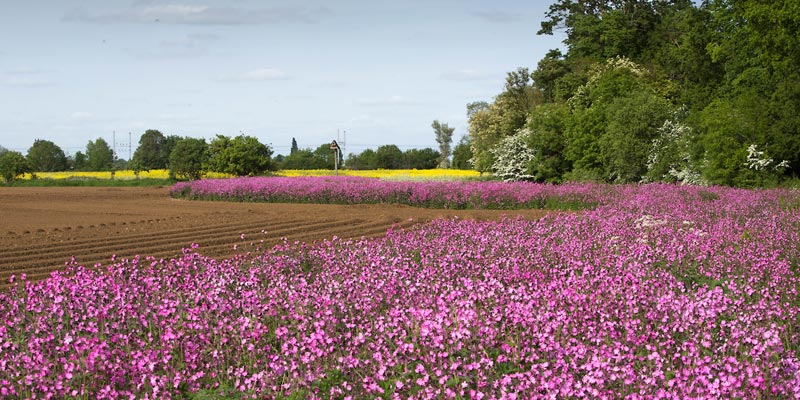
The lack of rain means that the farms make extensive use of irrigation, but this also provides greater control over key timings such as planting/drilling. The spread of farms across the area provides some insurance against crop damage ensuring that only a percentage of crops suffer.
Soil types
The Farm Operations Manager says: “Soil types can vary considerably even across a single field but in general we are farming on loam, a silty sandy mix which in some places can become very chalky and in others is very stoney – either gravel or flint. However, all of it is irrigatable and free-draining.”
The company provides year-round supply from its UK farms, its operation in Portugal and from other foreign suppliers. It grows and packs more than 30 different types of produce.
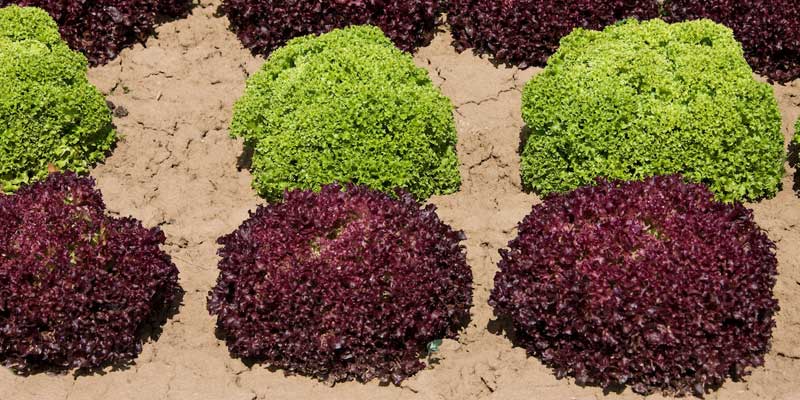
The great majority of the crops are grown outdoors but they also grow in polytunnels and glasshouses. Key outdoor crops include baby leaf spinach, coriander, flat and curly parsley, mint, chives and asparagus.
Other crops include cavalo nero, kale, asparagus, cauliflowers, organic green beans, organic kale and spinach, baby chard, and Pak Choi. Outdoor trials include tayberries, loganberries, red and blackcurrants, green and red gooseberries, and rhubarb.
Indoors in polytunnels, the company grows raspberries and blackberries, but the main crops are Pak Choi followed by basil and some thyme. All these crops are harvested and packed by the business at a site in Farningham.
The company also packs produce imported from Northern Europe and Africa as well as its business in Portugal.
Complex business
The manager says: “The complexity of our business means that we do need a fresh pair of eyes coming in and helping us to understand what’s going on and identifying the issues we have and monitoring the pest and disease levels across the country.
"This gives us early warning of any issues that may be coming our way and affect our crops. This is where the close relationship which we have with our agronomist is so important.”
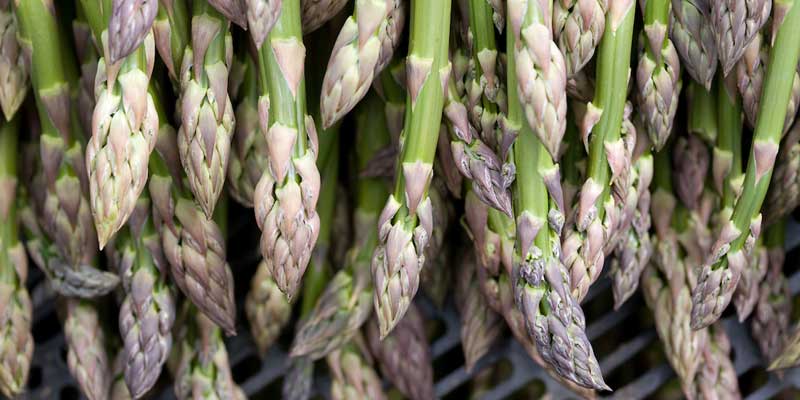
The farm business supplies into UK retailers, box schemes and wholesalers. It also supplies into catering, although this division has been severely affected by the COVID-19 pandemic and has led to the development of a direct-to-consumer business.
He says: “All of the produce we grow has been programmed in. We don’t grow any produce without having an order for it.”
Water and irrigation
The region suffers from low rainfall and irrigation is needed across its crops. The manager says: “The majority of water we use is extracted from boreholes and is distributed using a computerised system. This recognises when there is a leak on any of our farms and automatically shuts off the supply.
"We have variable-speed pumps which ensure we get exactly the right amount of pressure in the underground water system that we need to efficiently use the boom irrigators across the farms. We have introduced a new nozzle that throws the water out more and improves water retention in soil.
“The vast majority of our irrigation in polytunnels is drip irrigation for the established crops, which is very efficient. Around 10 per cent is for establishment and then we use computer-controlled overhead sprinklers which produce a
very fine mist, so it doesn’t cause erosion.
“In the greenhouses, the system again ensures the exact amount of water required and that it is recycled. Across all our systems we are constantly looking to make improvements and improve the efficiency of our water use.”
Role of the advisers
The farming business uses an agronomist from a farmer-owned and farmer-focussed agrochemical supply business. He is BASIS and FACTS qualified and has worked with the farm since 1978.
He says: “When I started working with this farm business when it was a 60-acre council smallholding. It has grown a lot in the years that we have worked together.
"I visit the business every week and walk the crops north of the river on a Monday, and will walk the Kent crops with the farm manager every Thursday. So, we would look at every crop on the farm every week.”
Long-term relationship
The farm manager says: “The beauty of my agronomist's long-term relationship with the business is that he knows every corner of every field.
"He knows the soils and the crops that have been grown there in the past. He has an encyclopaedic knowledge of the crops and the agronomy. He helps to bring stability to our decision-making. As such he is an essential part of our team.”
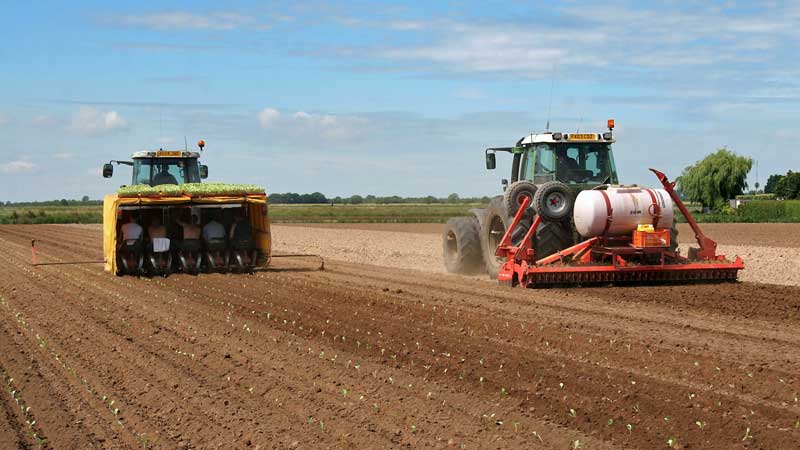
The agronomist also emphasises this point about the scope of his involvement with the company. He says: “I get involved with much more than just pest, disease and weed control. Of course, I do all that, it is a core part of my role as an agronomist, but I also have a key role when it comes to planning the work well ahead. We want to avoid crises wherever possible.
Supermarkets want a continuous supply of product and we have to do everything we can to provide that."
Delivering to supermarket standards
“One of the problems we have is trying to deliver perfect produce while reducing the use of crop protection products as much as possible. With the rising importance of Integrated Pest Management (IPM) it is a difficult line to tread. There are pressures on crop management from the supermarkets and we have to provide detailed lists of crop protection products we plan to use every year.”
For both agronomist and farm manager, one of the main benefits of an external adviser is the range of information and experience they bring from contact with other clients. The agronomist says: “We are hearing and seeing things from other growers we are working with and we can pre-empt problems before they happen.
“The other thing is we can look at the wider picture including issues like sustainability and see how they are going to play out both across the board and for this particular business. We can bring ideas onto the farm and see how they fit with the business and also for Watts Farms’ customers, either today or in the future.”
The farm manager says: “We are constantly trying to improve the way we do things, both commercially and from the point of view of sustainability. The input from the agronomist is invaluable and provides us with information to innovate. This relationship is built on trust and it is vital to the business.”
The farm business is not currently in any environmental schemes. It takes single farm payment (BPS) and also has two fields in organic conversion in Orpington, for which it receives support.
Environmental activity
When it comes to sustainability, one of the agronomist’s roles is to highlight activity that is already taking place and fits into schemes that are being planned such as ELMS.
He says: “A lot of the things which are highlighted in the schemes such as soil management and reducing erosion have been going on for a long time as part of good farming practice.”
The agronomist and farm manager have also worked together over the past five years to develop a nutrition strategy for the farms which has the potential to reduce the business’s carbon footprint. Changes have been made in the way the farms operate including changing the fertiliser regime to reduce applications.
This has reduced the amount of time spent travelling between farms and applying products, as well as reducing nitrates in the water environment. The new regime has also reduced the amount of disease in the crops.
Soil sampling is an ongoing part of the farms’ management of the land including ensuring that this new fertiliser policy meets its productivity requirements, meets client specifications and is environmentally acceptable.
The agronomist's distributor company and the farm plan to carry out more measurements this year to understand the progress that has been made in this area.
Beneficial insects
In the polytunnels, where Watts Farms produces its raspberries, this is the second year of a new way of working which means that the use of crop protection products has been reduced by 95%, as a result of using of beneficial insects.
The company is expanding the area of its wildflower mixes around the polytunnels to increase the presence of beneficial species.
It is also introducing native species of bumble bees to help with pollination. Previously the company used cereals as a break crop from vegetables.
However, in areas where vegetables would not grow, this led to a cereal monoculture. The paucity of the land meant that even the cereals grown were of poor quality. As a result, these crops have been replaced with a bespoke grass-legume mixture.
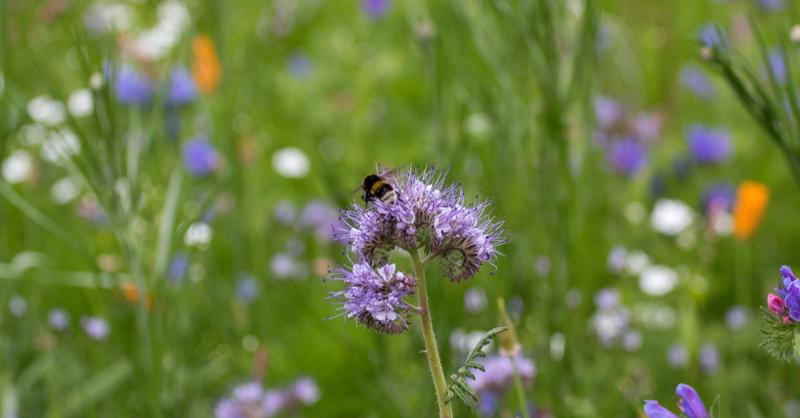
This is low maintenance and can be used for hay when it is mown. It will also stabilise the soil, reducing erosion, and reintroduce organic matter improving the soil quality.
Around the margins, these fields are also home to examples of the Deptford Pink, a rare flower that has to be preserved and is monitored by the Environment Agency and Natural England.
Over winter crops
Watts Farms sows over winter cover crops to avoid leaving land bare, wherever possible. For around 30 years they have used tail wheat from the cereals to provide a cover crop, which helps to reduce erosion, maintain nutrients, and increase organic matter prior to the sowing of vegetable crops in the spring.
Other fields have been put to grass for hay harvested by a local farmer, as well as fields that have been given over to grass and wildflower mixes. With herbicide options continuing to decrease for fieldscale vegetables, the company has invested in camera-guided steerage hoeing equipment.
New equipment which will arrive in spring 2021 will enable the company to use steerage hoeing on even more crops. In this region of the country erosion is an issue and the company have adopted cultivation techniques to ensure that this is minimised. In addition, compaction caused by tractors and irrigators is routinely ‘ripped’, to improve the quality of the soil and reduce run-off.
Also in this area of concern, the farm has introduced electric buggies for use with its asparagus crops. These have much less impact than conventional vehicles and have been adapted by the farming business to use solar panels to top up the batteries.
The farm is working with Cranfield University and exploring the use of Polyacrylamide which is designed to stabilise the soil surface.
Trials were conducted in 2020 and will continue this year. The major benefit of this is the reduction
in capping which is a particular problem with local sandy soils that have to be irrigated.
Pond and wildlife refuge
On the main packhouse site, the company have established a pond and wildlife refuge area. The farm manager says: “We have attracted seven different species of dragonflies and rare birds. We have installed four different designs of nesting boxes, and also have bats on the site. There is a lot of interest within the company in the wildlife on the farms including how we can work better with beneficial insects.”
Particularly in its Pak Choi and large-leaved Chard crops, they are introducing headland and in-field wildflower strips to encourage beneficial insects. This reduces dependence on pesticides and helps to deal with pests such as Cabbage Stem Flea Beetle, prevalent in neighbouring crops of Oilseed Rape.
There are public footpaths on many of the farms with signage including LEAF information signs. Taking an overview the agronomist says: “Good commercial farming and sustainability go hand in hand. As they say, ‘you have to be in the black to go green’! Also, if we can cut wastage it reduces cost and is good for the environment.”
How ELMS might work
The farm has asked their land agent to look at stewardship schemes with the option to consider more nectar mixtures and/or grass/legume mixtures. It is clear from the work that they have been doing that sustainable farming is high on their agenda and that there is a perception that it brings benefits to the business too.
Potentially ELMS offers the opportunity to be rewarded for the many initiatives that the farm is already taking while also enabling it to consider other areas of sustainable activity.
The agronomist says: “We need to explore what is available and just how proscriptive it is. If the benefits of the schemes outweigh any downside – including bringing a great degree of scrutiny – then it may be worth entering them.
"Many of the schemes to date have been poorly thought out and managed. Any new scheme has to work with our commercial objectives and those set by the supermarkets.
“I suspect the supermarkets will be ahead of the Government in setting their own schemes up and ‘gold-plating’ what Defra does.”
The farm manager says: “If we can find a way to bring it all together – the ELMS scheme and the requirements of the supermarkets on sustainability – and not negatively impact the farming business then we will adopt it as day-to-day practice. We have to be financially sustainable for this to make sense.
“We won’t jump into anything quickly, we need to understand what works, develop a complete understanding and make decisions for the long term. We won’t make decisions until we have the complete picture.”
The agronomist points out that some of the land that Watts farms on is rented and, therefore, long-term decisions are up to the landlords. He also wonders whether a scheme or schemes developed to fit arable and livestock farming will fit the requirements of field-scale vegetable production.
Overall, both the farm manager and his adviser agree that much more information will be required before they make any decisions concerning ELMS.
Areas for ELMS
Areas which are already being covered or could potentially be added to meet the ELMS criteria include:
- Soil management
- Creating and managing boundary features
- Field edges/buffer strips
- Choosing the appropriate fertiliser programme
- Crop management
- Integrated Pest Management
- Water supply management
- Managing surface run-off
- Drainage management
- Signage and information
- Access provision and facilities
- Engagement including events


